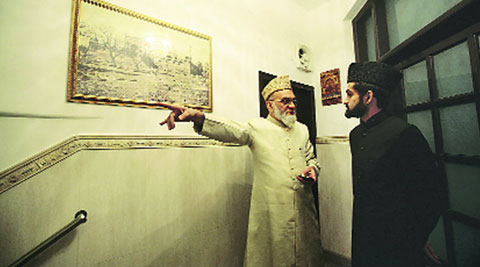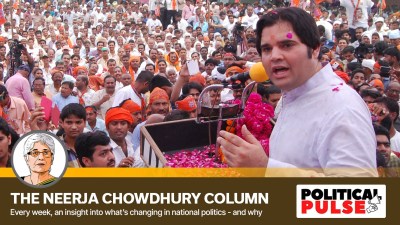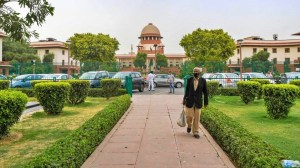- India
- International
Friend, philosopher and imam
The question of hereditary imams raises complex legal and religious questions.
 The responsibilities of an imam demand maturity and insight, and hence cannot be handed over to adolescents.
The responsibilities of an imam demand maturity and insight, and hence cannot be handed over to adolescents.
William Shakespeare wrote “some are born great, some achieve greatness, and some have greatness thrust upon them”. In India, some are “born” imams, some achieve imamat and some have imamat thrust upon them. So in which category does the imam of Delhi’s great mosque figure? This is a monumental question, whose answer would determine the religious validity and legal tenability of what is going on in that great historical building of India, the Jama Masjid.
The Arabic word, imam, literally means “leader” in a particular field of human activity. It can be used for any religious figure. Muhammad Iqbal, who wrote one of our national songs, “Saare Jahan Se Achha Hindostan Hamara”, had called Lord Ram the “Imam-e-Hind (Imam of India)”. In Islamic history, the epithet has been used in varied contexts. Sunnis use it for their great jurists. The names of the founders of the four schools of Islamic religio-legal thought — Abu Hanifa, Shafei, Malik and Ibn Hanbal — are always prefixed with “imam”. For Shias, imam means spiritual head of the community. On Prophet Muhammad’s demise, they had declared his son-in-law, Hazrat Ali, to be their first imam and later recognised 11 of his descendants from successive generations as the imam of the time.
In the context of mosques, imams are religious functionaries who lead congregational prayers. Until the middle ages, they were appointed by the ruler of the day. This is how India’s Mughal emperor, Shah Jahan, who built the Jama Masjid in the mid-17th century, appointed Syed Abdul Ghafoor Bukhari as its imam. Until the dynasty’s downfall, later Mughal rulers appointed an imam from among his descendants. In the course of time, the position assumed a hereditary character and incumbents began nominating their successors. The practice should be seen as a local custom. Under the principles of Islamic law, the position cannot be claimed as a matter of right, enforceable by the courts.
In contemporary Arab countries, imams are appointed by state authorities. In India, there is some sort of state establishment for each religion. For Muslims, this includes a Central Wakf Council and numerous state wakf boards, all of which are statutory bodies. Since all mosques are wakfs (religious endowments), the wakf boards appoint, declare or recognise their mutawallis (trustees) and imams. In the case of the Jama Masjid of Delhi, the hereditary character of its imam is recognised by the Delhi Wakf Board as a matter of practice and not by virtue of any binding law. A change in this practice would not violate either Islamic or Indian law.
A recent fatwa issued in Pakistan citing some jurists of the past says “In an Islamic state, the imam shall be appointed by the state authorities. In a non-Muslim state, the imam should be appointed at the community level because the collective prayers of the Muslims pertain not to their individual but to their collective lives. The imam should be appointed through consultation. In case there is a difference of opinion, the majority view among community representatives shall prevail.”

The Supreme Court of India held that “The question of the right to officiate in a public mosque has to be decided according to the principles of Muslim law and usage. Once a mosque is held to be a public mosque, Muslim law does not favour the right of a person to officiate as imam to be hereditary . because an imam must possess certain special qualities and special knowledge of the scriptures.” (Syed Mohd Salie Labbai case, 1976). Notably, the Muslim Personal Law (Shariat) Application Act, 1937, says that, in all disputed matters relating to wakfs, the “rule of decision” in the courts will be Muslim law, “notwithstanding any custom or usage to the contrary”.
Stating the nature and significance of imams in another case, the apex court of the country directed the Central Wakf Council and wakf boards to frame schemes for emoluments to be paid to imams (All India Imam Organisation case, 1993). This was tantamount to placing all imams in the country under the jurisdiction of the council and the boards, which qualify as the “state” as defined in the context of fundamental rights under Article 13 of the Constitution and are, therefore, covered by the higher courts’ writ jurisdiction.
The functions and responsibilities of an imam demand maturity and insight into all aspects of national and community affairs and hence cannot be handed over to adolescents. The community expects its imams to act as friends, philosophers and guides. Iqbal had wished: Khuda naseeb karey Hind ke imamon ko; wo sajda jis mein ho millat ki zindagi ka payam (may god destine for the imams of India a prostration that carries the message of life for the community). This meaningful wish has remained a cry in the wilderness.
The writer is a former chair of the National Commission for Minorities and is an ex-member of the Law Commission of India
express@expressindia.com
EXPRESS OPINION
Apr 25: Latest News
- 01
- 02
- 03
- 04
- 05










































